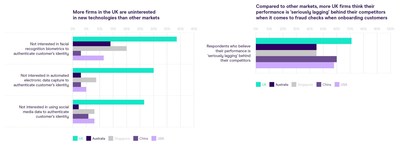GBG Study Reveals That UK Financial Services Are Lagging Behind Global Rivals
LONDON, February 19, 2018 /PRNewswire/ --
- 84 per cent of UK financial service organisations are concerned about their ability to identify customers correctly
- A third believe they are 'seriously lagging behind competitors' when it comes to fraud checks
- UK firms have less interest in adopting new approaches to authenticate customer identity, lagging behind China, Singapore and the US
Seismic changes in UK policy and legislation could be negatively impacting the UK financial service industry's ability to build a globally competitive digital customer experience.
(Photo: https://mma.prnewswire.com/media/643105/GBG_new_technologies_Infographic.jpg )
(Photo: https://mma.prnewswire.com/media/643111/GBG_digital_customer_experience_Infographic.jpg )
According to an international study commissioned by identity data intelligence specialist GBG and conducted by Forrester Consulting, the UK financial sector is lagging behind China, Singapore, the US and Australia in adopting new approaches to authenticating customer identity.
The findings show that 84 per cent of UK financial service firms are concerned about their ability to identify customers but UK firms are less focused on new technology solutions to address this, and appear more inward-looking, more focused on cost-control and less inclined to invest in new technology than their global counterparts.
Major regulatory changes this year including Open Banking and GDPR, as well as ongoing Brexit negotiations, are impacting the sector. At the same time customer expectations continue to rise as a result of digital empowerment and great experiences from the likes of Amazon, Apple, and Facebook.
Despite the UK's reputation as a world-leader in artificial intelligence, interest in new technology such as facial recognition, automated data capture and social media data analysis, has yet to be widely adopted in the UK. This means customers are missing out on seamless online transactions enjoyed in other markets.
Research highlights
- Spending on digital customer experience shows the UK behind global peers.
- UK financial service firms are prioritising cost control over the next 12 months more so than other markets.
- More firms in the UK are uninterested in new technologies than other markets.
- Compared to other markets, more UK firms think their performance is 'seriously lagging' behind their competitors when it comes to fraud checks when onboarding customers.
In 2018 we'll see unprecendented change in the financial service sector. At the same time, consumers are increasingly happy to use everyday digital services provided by organisations from across the world.
According to Forrester, financial service firms will live (or die) by delighting customers via digital channels. A tough economic environment, increased regulation, and greater competition have created challenges for incumbent financial service organisations; on the flip side fintechs delight with great experiences, but lack the strategic execution to comply with regulatory requirements.[i]
Mick Hegarty, Managing Director at identity data intelligence specialist GBG, said: "Although the UK is currently behind the rest of the world in its digital approach to customer identity, there are some promising signs for the future. Our research shows that UK fintechs are more interested than the established banks in adopting new approaches and more are planning to increase investment in the next 12 months. The fintech innovators and challenger banks will prove vital to the UK financial service sector in keeping pace with the rest of the world whilst we navigate a challenging year of legislation and policy change."
Download the full report here.
[i]. The research: Leaders in Financial Services Are Experts in Customer Identity, January 2018
GBG commissioned Forrester Consulting to conduct a study of 315 Fintech and Incumbent Financial Service organisations in Australia, China, Singapore, UK, and the US. The custom survey began in November 2017 and was completed in January 2018.


Share this article